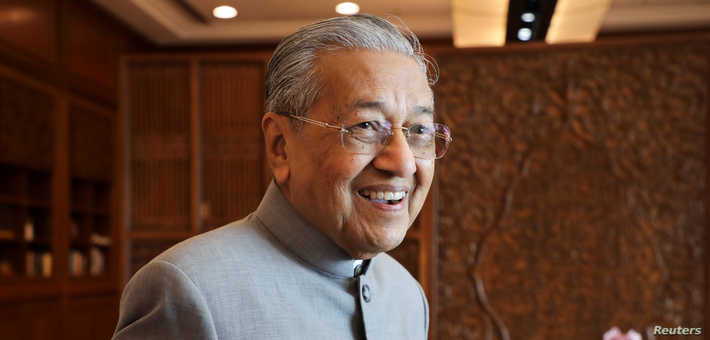Malaysia’s Mahathir Mulls Risks, Rewards of Postponed Power Transfer

Mahathir was savvy enough to see that serving the full term would all but guarantee Pakatan’s split and the parties’ defeat to their arch-rival the United Malays National Organization party (UMNO), a heavyweight of the toppled Barisan coalition.
(Voice of America) – Malaysia’s government looks increasingly likely to miss a promised mid-2020 leadership transfer from Prime Minister Mahathir Mohamad to coalition partner Anwar Ibrahim, raising fears of a succession scuffle that could split an already fragile alliance and cost it the next election.
The former mentor and protégé fell out in the late 1990s but joined forces again to hand the country’s long-ruling and corruption-mired Barisan Nasional coalition a surprise national election defeat in May 2018 by promising to clean up government, lower living costs and bolster minority rights. Heading into the polls, Mahathir, now the world’s oldest serving prime minister at 94, also vowed to step down to make way for Anwar after two years “at the most.”
However, Mahathir, enjoying his second spell as prime minister, after a 22-year run that ended in 2003, has dithered.
In an interview with Reuters last month, he reaffirmed his vow to anoint Anwar his successor. Only days later, at the Doha Forum in Qatar, an annual high-level policy gathering, he would not commit to Anwar as heir apparent and said he would consider stepping down only after Malaysia finished hosting the next summit of Asia-Pacific Economic Cooperation (APEC) countries in November.

Anwar has thus far faced Mahathir’s equivocations with equanimity, insisting that his ally-turned-rival-turned-ally would make good on their deal in due time. However, prolonged doubts about when or even if that will happen could still split their coalition — Pakatan Harapan, or the Alliance of Hope — said Ben Bland, director of the Southeast Asia Project at Australia’s Lowy Institute.
“There obviously is a risk that this very fragile coalition fractures because of a lack of clarity about the transition and the strength of these different personalities competing to secure the leadership, that they end up attacking each other and undermining their credibility and potentially damaging their prospects at the next election or even undermining their ability to even form a coalition at the next election,” he told VOA.

